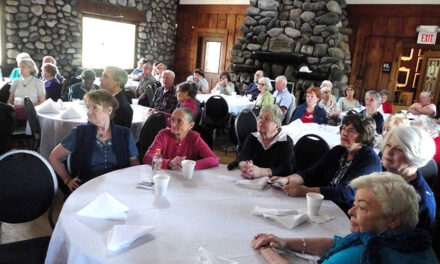Published May 24, 2019
This is another in the series of “Around Town” profiles and is a Memorial Day appreciation for a member of “The Greatest Generation.”
MELROSE — Esther Parsons has lived in Melrose for 68 years. This remarkable woman of 97 hailed originally from Syracuse, N.Y. She married an Everett lad, George Parsons, and started a family in 1943 during WWII.
After the war, she and her family moved to Melrose where she worked as a nurse for many years with area hospitals and the Melrose public schools.
She has lived the American dream: marriage, five children, eight grandchildren and 14 great-grandchildren. By any measure a full life for most people. Adding to this remarkable life is Esther’s service in the United States Army Nurse Corps during WWII. As Memorial Day approaches, the Weekly News sat down with this member of The Greatest Generation.
Tell us about your military service in WWII
I was in the Army Nurse Corps. I graduated from nurse’s training 1943. We’d been in the war for a bit. After graduation I immediately enlisted, which most of my class did, because there was a great need for Army nurses.
So you joined the Army?
We saw it as our patriotic duty to sign up.
Did you have to go through basic training?
Yes. I went to Atlantic City for basic training. We knew nursing but we didn’t know the army. We did 20 mile marches with packs on our backs. We were weren’t fragile. They had us crawl on the beach one night, full pack, with a drill sergeant on each end of the beach and they were shooting over our heads. They kept yelling, keep down, keep down. KEEP DOWN!
Really ?
And I kept down.
You were commissioned as an officer.
I was a 2nd Lieutenant.
So you met you husband at an Army hospital?
I was stationed at Fort Dix General Hospital in Trenton, N.J. George was severely wounded in fighting against Field Marshal Rommel’s forces in North Africa. He was recovering at the hospital I was assigned.
A WWII romance. That is so special.
He was a remarkable man. It was a short courtship and we were married. I was a 2nd Lieutenant and he was a Private. Definitely against Army regulations. But we loved each other.
And then you were shipped out ?
A few months later I got my orders. Time to ship out. We traveled on an English troop ship. It was in a convoy and we were escorted by Destroyers and Battleships. The Atlantic was full of German submarines so we had a full naval escort. It took two weeks to get to England.
Where were you eventually stationed?
Banbury Cross, Oxfordshire, England.
We didn’t know where we were headed until we were well underway. We landed in Plymouth, England on the South Coast. After a train ride several hours later, somewhere along the way, we stopped and the British Red Cross fed our unit. We were told to get out our mess kits and they gave each of us a ladle of oatmeal. Nothing else. It was the best meal my whole life.
At Barnbury Cross there was an American Army Hospital built near a stone castle. We lived in the castle. No heat. Stone cold water for showers. We had our backpacks and sleeping mats which are thinner than yoga mats. We had a fireplace but there was never any firewood. We slept like that.
What were your duties?
I worked in the burn ward. Many serious and difficult cases. Some burned from head to foot. About 30 fellas. They were wounded during the Battle of the Bulge. We had no penicillin. Only sterile dressing, Vaseline and pain medication. The pain was unbearable. Infection was the greatest danger.
This is how it was.
Outside of your nursing service, was there any memorable experience while in England?
Another nurse and I wanted to see London. We got an overnight pass and stayed in a little hotel. And all night long bombs were coming in. All the time. They called them V-Bombs (V-1 Flying Bombs or Buzz Bombs). It was continuous all night long.
What was London like?
Next day we walked to Trafalgar Square. Stone buildings were gone. Just piles of stone. Nothing was left. The city was demolished. There were no kids. They had all been shipped out to the country to keep them safe. Adults were sleeping deep down in the subway stations. The people were worn out. They had nothing. It was an eye opener.
Did you see the search lights at night?
Yes. And I saw our bombers going off for missions over Germany. They were bombing the Germans same as we were getting bombed.
How long were you in England?
About four months. In the middle of my service I thought I might be pregnant.
A Nurse would know.
Well, it turned out I was … pregnant. I carried my son George all the way to England and back. Now I was a patient so my military service ended. I was shipped home and was handed my honorable discharge. Ten months of service and thank you very much. That was it.
So you were taking care of your future husband at a military hospital in New Jersey. Fall in love. Get married. Ship out shortly thereafter, and several months later find out you are pregnant. What an adventure for a young woman.
It was an adventure. All a blur to me now.
Would you consider your service in WWII as a life-changing experience?
Absolutely. Because of seeing those men who were hurt so badly.
And you’re a veteran.
I’m a proud veteran. I’m a member of the Melrose Veteran’s Club. I’m a member of the Disabled American Veterans and a life-member of the Veterans of Foreign Wars.





